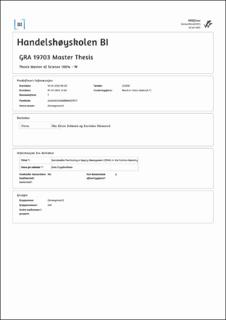| dc.description.abstract | Sustainable practices across fashion supply chains have gained an increased importance over the past few years. As the fashion industry is the second most damaging economic sector, many brands strive for incorporation of more efficient and sustainable operations. Fashion businesses acknowledge the urgent need for transformation of production patterns while taking into consideration Triple Bottom Line dimensions. They also underline the importance of achievement of Sustainable Development Goals (SDGs). However, this cannot be reached without alteration of purchasing and supply management processes (PSM). PSM not only influences the structure and the output of the supply chain, but also constitutes a large part of spending in the case of many businesses. Driving innovation and sustainability efforts in the PSM sphere, creates value for businesses, but it is still not clear how fashion should approach this topic in order to extract most benefits.
The purpose of this study is to investigate how PSM practices can enable the achievement of sustainability goals in fashion. Additionally, the thesis aims to explore drivers, conditions, and barriers for PSM as an enabler in this specific sector in order to identify trade-offs and create useful recommendations. Therefore, the research question is: “How can purchasing and supply chain management practices enable the achievement of sustainability goals in the fashion industry?”. In order to answer this question, a qualitative study was conducted. After thoughtful analysis of the literature, the empirical material was collected, including semi-structured interviews with representatives of Scandinavian fashion brands and sustainability experts. Additional information from sustainability reports was gathered in order to examine the current industry situation and evaluate drivers, conditions, and barriers for PSM.
Our analysis of theoretical and empirical findings showed that PSM can enable the achievement of SDGs and improve the overall sustainability performance of a company. However, there are certain conditions that need to be fulfilled by fashion businesses in order to enhance this transformation. These include investing in PSM knowledge and technology innovation, understanding the concepts of TBL and ISO 20400, identifying consumer personas and adjusting business philosophy. All of this needs to be supported by top management and legislation that will boost the general sustainability incentives in the sector. | en_US |
